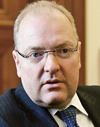UniCredit to refocus on what it does best

Helmut Bernkopf, UniCredit
UniCredit’s new private banking chief, Helmut Bernkopf, is seen as a safe pair of hands to guide the bank back towards its core markets
UniCredit’s new head of Private Banking, Helmut Bernkopf, has been busy tweaking his business strategy. His predecessor Andreas Wolfer tried to put his mark on the bank’s substantial European wealth management footprint, but left the institution quietly last year, without any announcement.
His replacement at the top, Mr Berknkopf, is a UniCredit veteran, with the bank in its various incarnations since 1994, including a two-year stint in Moscow, where he headed up the institution’s Russian franchise.
It is unlikely that he will rock the boat immediately, as the circumstances of the bank are very different to last year, when there was still talk about aggressive expansion through acquisitions. As PWM went to press, UniCredit shares were struggling, ahead of a €7.5bn rights offering to boost the bank’s financial stability.
While the private bank is the area of UniCredit least affected by regulatory and capital market constraints, expansion into new geographical areas, particularly in Eastern Europe, are being scaled down, with the notion of a safe pair of hands now needed to guide the operation through an uncertain climate.
Rather than introducing new service and delivery models, Mr Bernkopf is fine-tuning existing arrangements to enhance customers’ sense of security and eliminate volatility during 2012, shepherding clients into short-term deposits rather than structured notes. But from next year he will start to beef up the advisory model and the select circle of ‘preferred partners’ used to manage key products.
Currently, 1300 relationship managers handle 235,000 private clients. Unlike the substantial job cuts in the group’s retail and investment banking businesses, Mr Bernkopf is not expecting to impose significant redundancies. Management expects him to preserve current cost structures, while gradually growing the business. Private banking, they say, will not escape the “challenging implications” of the group’s five-year plan.
He will refocus on core businesses in Italy, Germany, Austria and Poland, which account for 95 per cent of managed assets. Private banking will still be offered in Slovakia, Russia, Turkey and Serbia, but on a smaller scale.
Entry into the booming Asian market has been considered and dismissed for the foreseeable future by the bank’s business analysts, who have seen European competitors invest vast resources yet struggle to build significant market share in the Far East. “Germany, Austria and parts of Italy are still the richest regions in Europe,” says Mr Bernkopf. “Despite the considerable problems European economies are now facing, there is still significant wealth held by private investors.”
Wealthy individuals account for €156bn in assets, including deposits, custody and investments, with managed assets representing €43bn of this. There is still a feeling among the bank’s board members that the institution is punching below its weight in private banking. Because the group is made up of different entities including HypoVereinsbank in Germany, BankAustria and Poland’s Bank Pekao, its imprint in Europe is seldom appreciated.
But rather than concentrate solely on unifying all private banking under the UniCredit brand, which was an obsession of the previous regime, Mr Bernkopf will also be building on the success of some of the bank’s smaller brands, particularly that of Schoellerbank in Vienna, which will act as the group’s hub for ultra high net worth clients from Central and Eastern Europe.
“Rich people in some CEE markets can be counted on two or four hands,” says Mr Bernkopf. “It’s easier to service them on a cross-border basis rather than establish a product and advisory capability in each market.”
Recent research suggests many clients were not so keen swearing their allegiance solely to the UniCredit brand, particularly in those markets outside Italy. BankAustria, for instance, has customer satisfaction and awareness rates of more than 90 per cent in its home market, so plans to further rebrand with the Italian name have been shelved.
“Everybody realises they are part of the UniCredit group, so we do not have plans now to rebrand more than we have done already,” admits Mr Bernkopf. Rather than harmonising the look and feel of the service, he will be concentrating on creating a common operational and investment strategy.
“Even if we allow local variations, such as different benchmarks, which can overweight certain asset classes, we will not have one investment operation in one market and another elsewhere,” he states, with an increased co-ordination between different investment committees across the bank.
Despite the current emphasis on housekeeping rather than significant expansion, longer-term targets remain ambitious. Mr Bernkopf admits the bank is far from the best-known wealth manager in Europe as things stand, and that there is much positioning to be done. “In three years time, we want to be the first name that comes to your mind in the private banking business,” he says.




